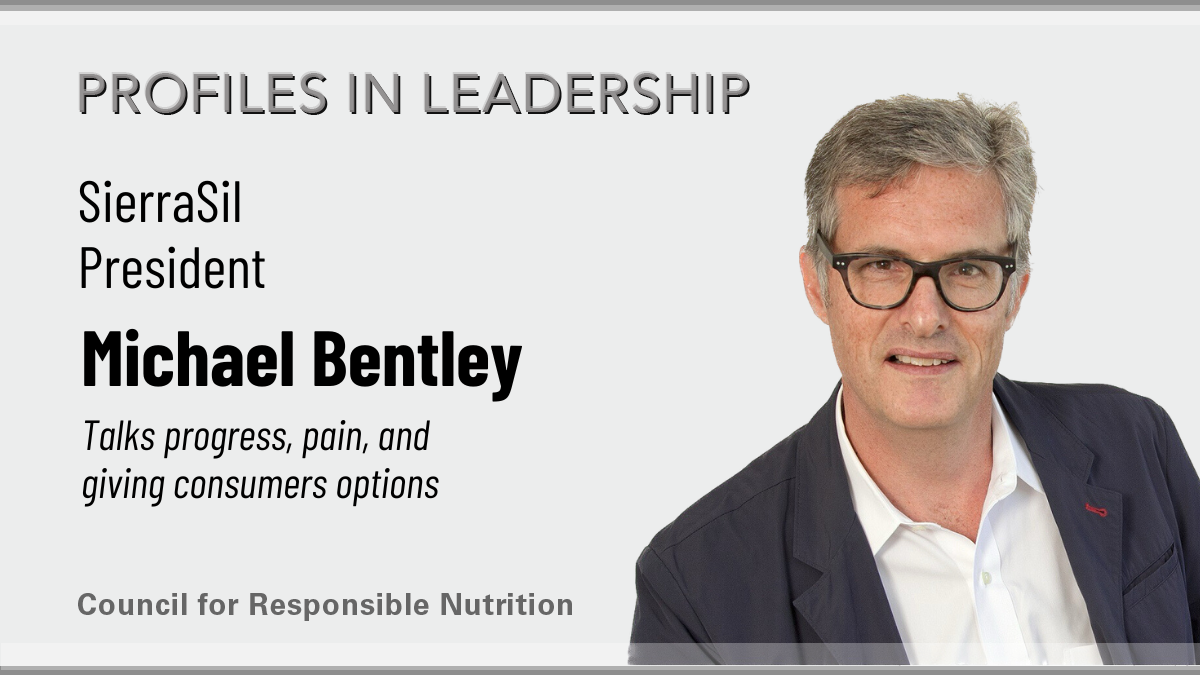Learn about President Michael Bentley's, of CRN member SierraSil®, approach to industry challenges in this new “Profiles in Leadership” installment.
 Michael Bentley speaks in the purposeful, measured cadence of a college professor. You feel like whatever he is about to tell you, you should be taking notes. It will undoubtedly be important; an insight is in the offing.
Michael Bentley speaks in the purposeful, measured cadence of a college professor. You feel like whatever he is about to tell you, you should be taking notes. It will undoubtedly be important; an insight is in the offing.
Today the veteran supplement industry executive and CHFA Leadership Award recipient isn’t teaching a college class, but rather sharing with CRN how important the mission of his company, SierraSil®, is to him. It is, he explains, about improving the quality of people’s lives.
A quality that improves for many when they take his company’s flagship ingredient: a naturally occurring hydrothermal mineral complex from the Sierra Mountains.
Bentley has many examples to prove his point. There’s the neurosurgeon who relies on the company’s joint health product. Or the woman from Portland, Oregon with joint health issues, who was looking for a product that would be gentler on her stomach. Or the pro golfer who told Bentley he had never experienced such a prolonged period of freedom from joint and muscle soreness.
But for Bentley, the mission is bigger than having an efficacious product, with a base of loyal customers. It’s also about giving consumers an option in addition to other interventions.
“There are supplements that help to give people a choice,” said Bentley. “Instead of only being relegated to taking standard medications, some people are able to de-medicalize with diet, exercise and a combination of supplements to cope and even thrive.” Bentley noted that the use of some supplements also translates into a significant cost savings to the health care industry, as CRN pointed out in the Supplements to Savings report.
Perhaps bold talk from a man that freely admits he used to be a “supplement skeptic.” That is until he took a “home brew” of the minerals that would ultimately make up his company’s flagship product and was able to run without pain in his knees for the first time in years. The transformation in his athleticism made him a convert.
Even after investing in extensive safety and efficacy research, Bentley does have frustrations with the regulators, which has led to more than a few sleepless nights. “Why does the FDA prohibit a supplement company from revealing patents if the patents name a disease state, even if the reference would be FTC compliant?” he asks. “Or in Canada, where we have had good regulations, why is Health Canada adding further complexity and cost that are, in practice, contrary to their stated objectives?”
“Sometimes it feels like the regulator is trying to eliminate supplements or judge them by risk factors that are not appropriate,” said Bentley, who also worries about how crowded and competitive the marketplace is. “It doesn't matter how good your product is, you need to cut through the noise. And trying to do so with a small business is a genuine challenge.”
After 20 years in the industry, he knows a thing or two about challenges, and has plenty of advice for upstarts looking to get into the business. First bit of guidance for early-stage entrepreneurs: go to the industry’s trade shows where, Bentley points out, newbies will encounter “how our industry is so willing to help each other out… there's a lot of people with good hearts and they're open to mentoring.”
And the second bit of advice? Focus on quality. Live and die by your commitment to your GMPs, says Bentley. Follow that up with not biting off more than you can chew by starting out regionally before you even think about marketing your products nationally. And, to round out his recommendations, focus your company’s efforts on delivering a product that “actually benefits people.”
Although he has sage advice for those just starting out in the industry, he’s candid about not having it all figured out himself.
“We're not where we want to be yet. Our goal is to restore ability and joy for people with chronically sore joints or muscles. We haven't reached our objective and we're a long way from it,” said Bentley. “And so, we've got a lot of work to do to achieve that objective.”
And that objective, he said, might be getting out of the direct-to-consumer model and becoming an ingredient supplier. Bentley is, however, slightly reticent over that realization. “I love engaging with the consumers. Because I love seeing their smiles when our products make them feel better,” said Bentley. “But I need to do the right thing for our mission, which is to help a million people be healthier and more active naturally. And so, if that means letting go of the consumer side, I'm prepared to do it. Ultimately, we need to be partnering with companies that are well capitalized and can help us achieve our mission.”

